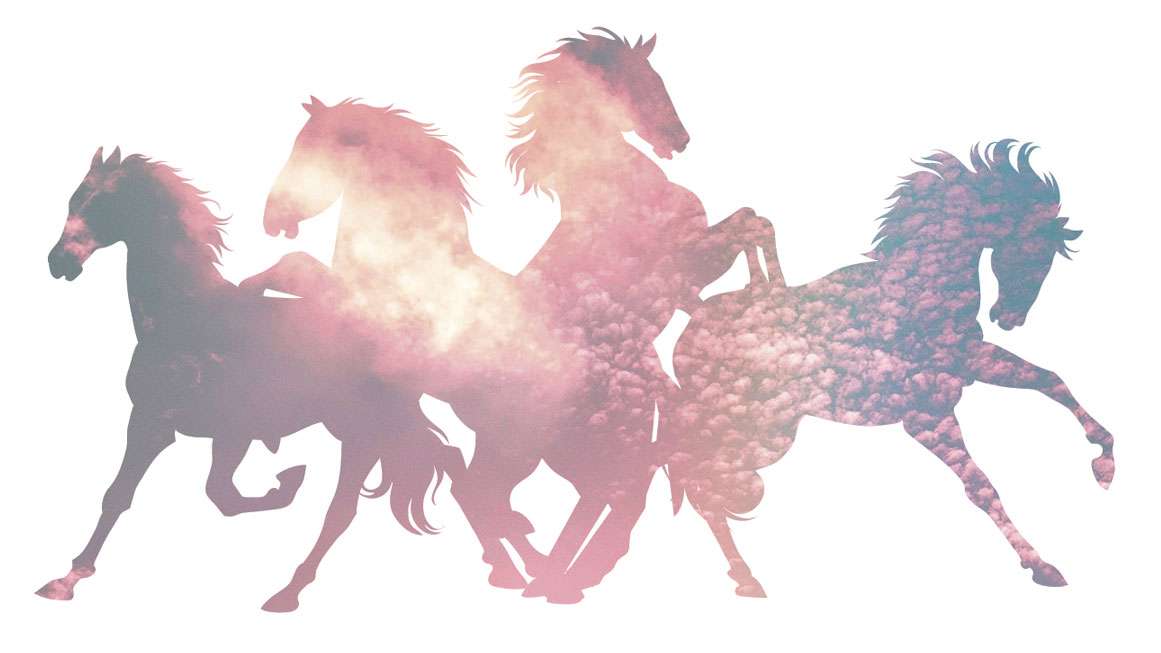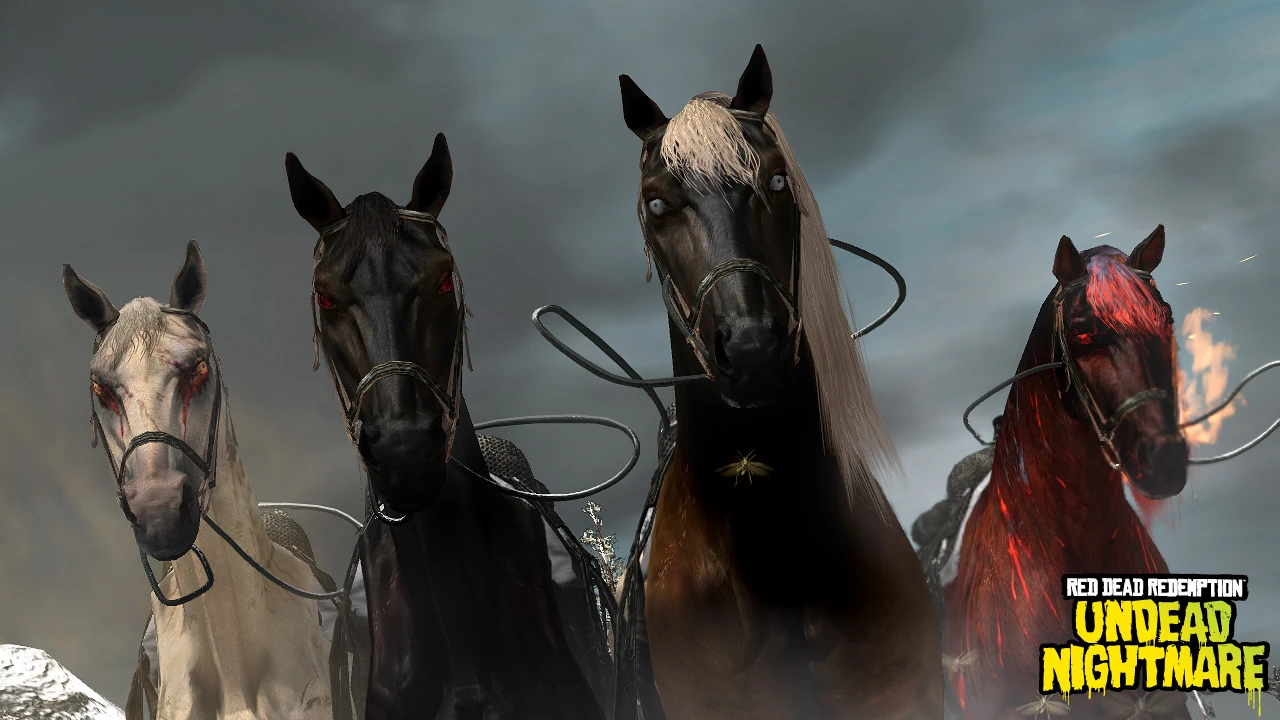
Impending Defeat for the Four Horsemen of the Apocalypse
Pestilence, war, famine, and death are all on the decline.
Pestilence, war, famine, and death are all on the decline.
Most of you think that the world, in general, is getting worse. You are wrong. Citing uncontroversial data on major global trends, I will prove to you that this dark view of humanity's prospects is, in large part, badly mistaken.
First, though: How do I know most of you believe that things are bad and getting worse? Because that's what you tell pollsters. A 2016 survey by the public opinion firm YouGov asked folks in 17 countries, "All things considered, do you think the world is getting better or worse, or neither getting better or worse?" Fifty-eight percent answered worse, and 30 percent chose neither. Only 11 percent thought things are getting better. In the United States, 65 percent thought that the world is getting worse and 23 percent said neither. Only 6 percent responded that the world is getting better.
A 2015 study in the journal Futures polled residents of the U.S., the U.K., Canada, and Australia; it reported that a majority (54 percent) rated the risk of our way of life ending within the next 100 years at 50 percent or greater, and a quarter (24 percent) rated the risk of humans being wiped out in the next 100 years at 50 percent or greater. Younger respondents were more pessimistic than their elders.
So why are so many smart people like you wrong about the improving state of the world? For starters, almost all of us have a couple of psychological glitches that cause us to focus relentlessly on negative news.
Way back in 1965, Johan Galtung and Mari Holmboe Ruge of the Peace Research Institute Oslo observed "a basic asymmetry in life between the positive, which is difficult and takes time, and the negative, which is much easier and takes less time." They illustrated this by comparing "the amount of time needed to bring up and socialize an adult person and the amount of time needed to kill him in an accident; the amount of time needed to build a house and to destroy it in a fire, to make an airplane and to crash it, and so on." News is bad news; steady, sustained progress is not news.
Smart people seek to be well-informed and so tend to be more voracious consumers of news. Since journalism focuses on dramatic events that go wrong, the nature of news thus tends to mislead readers and viewers into thinking that the world is in worse shape than it really is. This mental shortcut is called the availability bias, a name bestowed on it in 1973 by the behavioral scientists Amos Tversky and Daniel Kahneman. "People tend to assess the relative importance of issues by the ease with which they are retrieved from memory—and this is largely determined by the extent of coverage in the media," explains Kahneman in his book Thinking, Fast and Slow.
Another reason for the ubiquity of mistaken gloom derives from evolutionary psychology. A Stone Age person hears a rustle in the grass. Is it the wind or a lion? If he assumes it's the wind and the rustling turns out to be a lion, then that person does not live to become one of our ancestors. We are the descendants of the worried folks who tended to assume that all rustles in the grass were dangerous predators. Due to this instinctive negativity bias, most of us attend far more to bad rather than to good news.
Of course, not everything is perfect. Big problems remain to be addressed and solved. As the Harvard psychologist Steven Pinker says, "it's essential to realize that progress does not mean that everything gets better for everyone, everywhere, all the time. That would be a miracle, that wouldn't be progress."
For example, man-made climate change arising largely from increasing atmospheric concentrations of carbon dioxide released from the burning of fossil fuels could become a significant problem for humanity during this century. The spread of plastic marine debris is a big and growing concern. Many wildlife populations are declining, and tropical forest area continues to shrink. And far too many people are still malnourished and dying in conflicts around the globe.
But many of those problems are already in the process of being ameliorated. For example, the falling prices of renewable energy sources offer ever-stronger incentives to switch away from fossil fuels. And hyperefficient agriculture is globally reducing the percentage of people who are hungry—while simultaneously freeing up land, so that forests are now expanding in much of the world.
The fact that we denizens of the early 21st century are much richer than any previous generation accounts for much of the good news. Thanks to technological progress and expanding global markets, the size of the world's economy since 1820 has grown more than 100-fold while world population grew somewhat less than eightfold. In concrete terms, world gross product grew from $1.2 trillion (in 2011 dollars) to more than $116 trillion now. Global per capita GDP has risen from $1,200 per year in 1820 to more than $15,000 per person currently.
The astonishing result of this increase in wealth is that the global rate of absolute poverty, defined as living on less than $1.90 per person per day, fell from 84 percent in 1820 to 55 percent in 1950. According to the World Bank, 42 percent of the globe's population was still living in absolute poverty as late as 1981. The latest World Bank assessment reckons that the share of the world's inhabitants living in extreme poverty fell to 8.6 percent in 2018. In 1990 about 1.9 billion of the world's people lived in extreme poverty; by 2018, that number had dropped to 660 million.
In Christian tradition, the four horsemen of Famine, Pestilence, War, and Death usher in the apocalypse. Compared to 100 years ago, deaths from infectious diseases are way down; wars are rarer and kill fewer people; and malnutrition has steeply declined. Death itself is in retreat, and the apocalypse has never looked further away.

According to the World Bank, the global crude death rate stood at 17.7 per 1,000 in 1960. That is, about 18 people out of every 1,000 persons in a community would die each year. That number has fallen to 7.6 per 1,000 in 2016. The global death rate has fallen by more than half in the last 60 years.
Food production since 1961 has essentially quadrupled while global population has increased two and half times, according to the World Bank. As a result, the Food and Agriculture Organization reports, the global average food supply per person per day rose from 2,225 calories in 1961 to 2,882 calories in 2013. As a general rule, men and women need around 2,500 or 2,000 calories per day, respectively, to maintain their weight. Naturally, these values vary depending on age, metabolism, and levels of physical activity, among other things.
Prior to its eradication in 1979, smallpox was one of humanity's oldest and most devastating scourges. The disease, which can be traced all the way back to pharaonic Egypt, was highly contagious. A 1775 French medical textbook estimated that 95 percent of the population contracted smallpox at some point during their lives.
In the 20th century alone, the disease is thought to have killed between 300 and 500 million people. The smallpox mortality rate among adults was between 20 and 60 percent. Among infants, it was 80 percent. That helps explain why life expectancy remained between 25 and 30 years for so long.
From 1990 to 2015, access to improved water sources rose from 76 percent of the world's population to 91 percent. Put differently, 285,000 people gained access to clean water each day over that time period.
As a result of growing access to clean water and improved sanitation, along with the wider deployment of rehydration therapy and effective rotavirus vaccines, the global rate of deaths from diarrheal diseases stemming from rotavirus, cholera, and shigella has fallen from 62 per 100,000 in 1985 to 22 per 100,000 in 2017, according to The Lancet's Global Burden of Disease study that year. And thanks to constantly improving medicines and pesticides, malaria incidence rates decreased by 37 percent globally and malaria mortality rates decreased by 60 percent globally between 2000 and 2015.
Your chances of being killed by your fellow human beings have also been dropping significantly. Lethal interpersonal violence was once pervasive. Extensive records show that the annual homicide rate in 15th century England hovered around 24 per 100,000 residents, while Dutch homicide rates are estimated as being between 30 and 60 per 100,000 residents. Fourteenth century Florence experienced the highest known annual homicide rate: 150 per 100,000. The estimated homicide rates in 16th century Rome range from 30 to 80 per 100,000. Today, the intentional homicide rate in all of those countries is around 1 per 100,000.
The Cambridge criminologist Manuel Eisner notes that "almost half of all homicides worldwide occurred in just 23 countries that account for 10 per cent of the global population." Unfortunately, medieval levels of violence still afflict such countries as El Salvador, Honduras, and South Africa, whose respective homicide rates are 83, 57, and 34 per 100,000 persons.
Nonetheless, the global homicide rate is falling: According to the Institute for Health Metrics and Evaluation, it has dropped from 6.4 per 100,000 in 1990 to 5.3 per 100,000 in 2016. That's a reduction of 17 percent during a remarkably short period of 26 years, or 0.7 percent per year.




